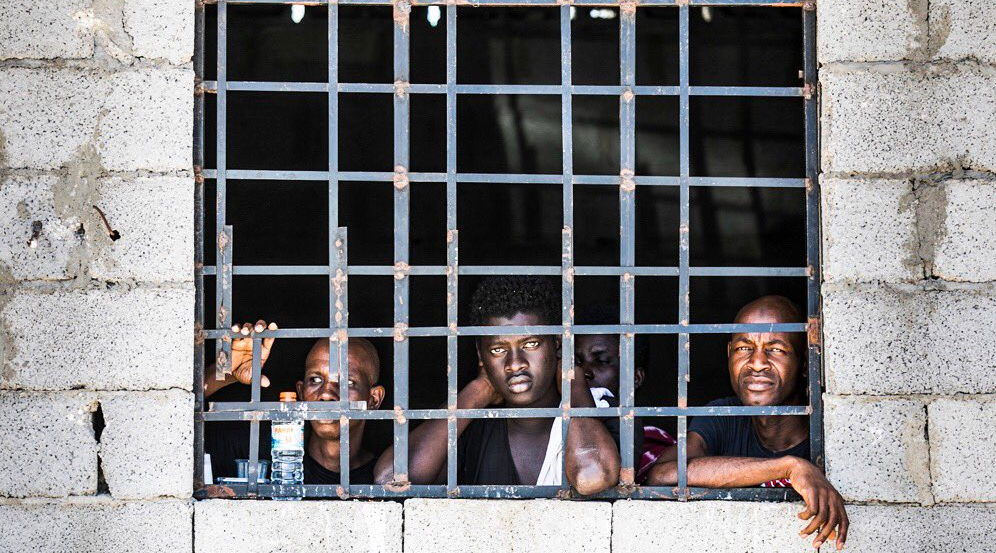
Nigerian migrants return from Libya
The ordeal of Africans nationals caught in the web of the new slave trade in Libya has continued to send shock waves across the world. There have been reports of Africans being sold and resold for upwards of $400 with several dying in the process.

While many Libyans regard the thriving trade in slaves as a lucrative business, African governments, the European Union and the United Nations are moving in, not only to stop the trade but also to tackle the humanitarian crisis associated with it.
The Federal Government said, yesterday, that it has so far identified 2,778 Nigerians trapped in the Libyan detention camps. Of this figure, it said 250 would be repartriated yesterday, as part of the 250 that were being repartriated every week. So far the government said 3,000 have so far returned from the Libyan enclave.
Foreign Affairs ministry spokesman, Tiwatope Elias-Fatiile, said in the statement that the 2778 were Nigerians identified in detention camps that embassy officials had been visiting. Those registered in these camps, the spokesman said, were issued with emergency travel certificates.
While the government indicated that the repatriation exercise was a continuous exercise, it noted that it would continue to engage the legitimate government in Libya and other stakeholders in addressing the plight of Nigerian migrants in that country.
A report from CNN indicates that Libya has become attractive for this modern trade in migrants and refugees because of its location as a transit point for Africans who try to reach Europe by sea.

The report notes that at least 150,000 people have tried to cross the Mediterranean Sea from Libya in the last three years. At least 3,000 refugees have paid the supreme price while trying to make the dangerous crossing.
The Internationl Organisation for Migration, IOM, the United Nations migration agency, has rallied support from European nations and particularly Italy for the Libyan Coast Guards who are particularly ordered to prevent boats that smuggle migrants and refugees from Libya to Europe. At the moment, IOM estimates that between 400,000 and one million migrants that have found their ways into Libya were in that country’s detention centres. And from these detention centres have come all the obnoxious reports of robbery, rape and murder of the migrants that have caused considerable concern to the conscience of the world.
A male who returned from the Libyan enclave with one eye narrated his ordeals. He said, “We didn’t take our bath for two months, and did not brush our teeth. Some of us fixed pipes to our private parts to be able to urinate. Some of us have bullet wounds.
The Libyans treated us like slaves; in fact more than slaves. I don’t know how to classify the treatment. “I’m a married man of 35, and graduated from the Delta State Polytechnic, Oghara-Otefe, in Business Administration Department.
Most of us are wearing dreadlocks like mad men, but we are not mad. It was the United Nations, UN, that compelled them to release the migrants in secret cells.” Migrants in secret cells A female returnee who spoke in pidgin English said, “I give thanks to God that we have returned from Libya. Those who say they want to go to Italy by road should understand that it is not an easy journey. I was locked up in an apartment for four days without food or water. I almost died; it was God who saved me. Those who are listening to me should please stay back and work in the farm. This is better than travelling by road. The Libyan prisons are not meant for human beings.”
Another male returnee said, “Every uniformed man in Libya is building a prison, a private prison. That is what they are doing. They would come to tell our people that they need Manamish. The Manamish would pick you up and free you to go to the town. In the town, they would lock you up in another prison. It is the business they are doing now.
When they lock you up, they would go back to the United Nations, UN, to inform them that they are running a deportation camp, and the UN would give them money. Thousands of Nigerians were being transferred from prison to prison, but would not be deported even though they would say they wanted to deport these migrants. “They would arrest Nigerians at sea, and say they do not want them to go to Italy. Later, they would bring the migrants back to Libya and lock them up in prisons, beat, humiliate, and torture them.






